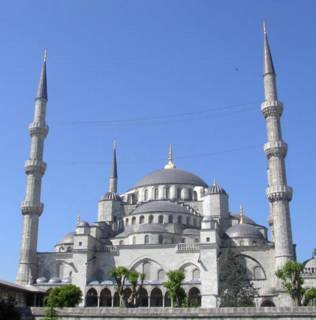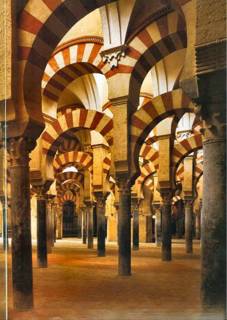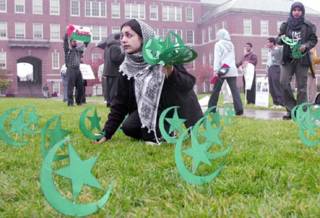Just when you thought it was safe to return to the Ministry for some mindless entertainment, we bring you...
Questions of Faith, Part IX

Our guest blogger, Wahab, is a lifelong Muslim from Algeria. He works as an instructor at Regis University, where he teaches Islamic history (as well as Statistics and Calculus). As usual, feel free to post your questions in the comments section.
----------------------------------------------
1) What faith do you espouse?
The faith I espouse is Islam.
2)Who was the founder of your faith? When did he/she live?
The founder was Mohamed who came following Jesus approximately 600 years later.
3)What are the sacred texts of your faith?
The main sacred book of Islam is called the Quran, which is also spelled Koran. Then, there is a collection of the sayings of the prophet Mohamed called the “Hadith."
4)What is the central teaching of your faith?
The central teaching of Islam is basically Abrahamic. It teaches us to believe in one Omnipotent, Almighty God. The God of Abraham: the creator of the universe. To believe in the resurrection or judgment day when we all have to respond to our deeds once faced with God. At that time we will enjoin in the companionship of the Almighty God and his beloved prophets and messengers and followers.
5)How does your faith define sin? What are the major sins, and how is one absolved?
A sin is any action or behavior that goes contrary to the teaching of God. The most unforgivable sin is to associate another deity with God. No one/nothing is worthy of worshipping except God. In this instance, the Trinity is a major sin in Islam as it associates a "three-wholeness" with God. Islam speaks of the oneness of God rather than the unity of God. A person is absolved by supplication and asking for forgiveness from God. Only God can grant such forgiveness, without any outside intervention, human or otherwise (no priesthood).
6)Roughly how many adherents does your faith have?
There are approximately 1.3 billion people adhering to Islam worldwide.
7)What does your faith teach about the afterlife? Is there heaven, and how do you get there?
Islam teaches that from dust we come and to dust we shall return and be resurrected on judgment day when all of us shall account for our good and bad deeds. We will join either the company of God in heaven or the company of Satan in the everlasting hell. The bottom line is that it's by the grace of God that we will succeed, not only through our good deeds in this life. It is a check and balance phenomenon where we’re all supposed to do good deeds and avoid mischief and malfeasance.

8)What are the practices of your faith? (Daily, weekly, etc.)
There are basically 5 pillars in Islam that must be reflected on the Muslim person on a daily, monthly, and yearly basis. Muslims are supposed to observe five daily prayers to regulate their daily lives and keep them constantly in touch with God while keeping Satan at bay. They are encouraged to share their wealth and what God has bestowed on them with the poor and needy. In addition, the wealthy in the community are ordered to share a certain percentage of their wealth on a yearly basis, similar to a tax levy. Fasting during the month of Ramadan from sunrise to sunset brings the community wholesomely together during good and bad times. It encourages fellowship and strengthens the bonding between members of the family and community at large. Charity is actively practiced during this holy period of fasting. Finally, the Hajj or pilgrimage to the holy land of Mecca and Medina is prescribed for the wealthy & healthy of the community.
9)How is your faith organized? Are there priests and bishops and archbishops oh my!)?
Islam is practiced by its followers but sponsored by the learned ones in the community. It does not follow a hierarchy of clerics or priests. Each person, mature male or female, is responsible for acquiring the knowledge to be a good practicing Muslim. There are scholars at the disposition of the faithful in order to help them learn the ropes for good practicing and understanding of Islam. Each faithful is wholly responsible for his or her actions. The Quran is the source of knowledge and understanding God’s nature and laws. The teachings of the prophet Mohamed are there during this journey to complement the search for knowledge.
10)Are there regular services available to you locally? If so, where?
There are mosques and gathering locations for Muslim to worship on a regular basis and on Friday afternoon community services in particular; Metro-Denver, Boulder, Golden, Colorado Springs, Fort Collins. (editor's note: In Laramie, we have the Islamic Center of Laramie, 612 E. Garfield.)

11) How did you come to be a believer?
I was born and raised Muslim but surrounded by people of the Jewish and Christian faith during my early childhood. During my adult life I reserved some time to learn more about Judaism and Christian and contemplated other faiths as well. I participated with many different interfaith groups and committees. This strengthened my belief in Islam and the teachings of the prophet Mohamed.
12)What do you wish others knew about your faith?
I wish other people would be more open to learning about Islam and discover its simplicity, rationality, and reasonableness.
-----------------------------------------------------
If you have question that you wish to address to Wahab privately, feel free to send them to the Email address listed in my profile and I'll forward them along to him.
Subscribe to:
Post Comments (Atom)




1 comments:
the blue mosque picture is taken from this istanbul city guide :
http://perso.wanadoo.fr/istanbul/index_english.html
stephane mugnier
(the author of this picture)
Post a Comment